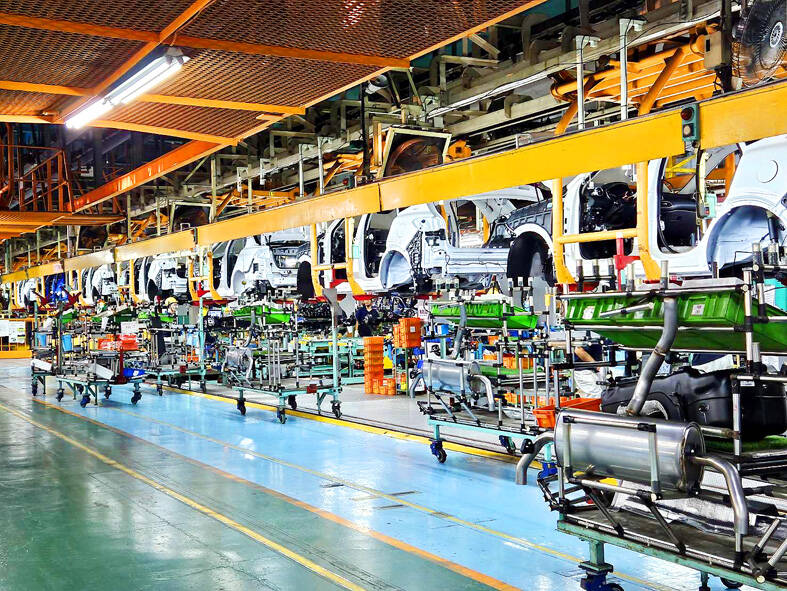Reducing import tariffs on complete vehicles would weaken the domestic automobile and automotive electronics industries, the Taiwan Transportation Vehicle Manufacturers Association (台灣車輛公會) said yesterday, while expressing hope that the government would pay more attention to the long-term development of domestic industries.
In a statement issued after US President Donald Trump announced the imposition of a 25 percent tariff on imported vehicles starting on Wednesday next week, the Taipei-based association said that the higher levies imposed by the US would have little impact on Taiwan’s automobiles and Trump’s purpose is to expand the establishment of production facilities in the US by global automakers.
Taiwan should not unconditionally and proactively reduce import tariffs on complete vehicles in response to the US move or it would have an irreparable effect on the entire automobile industry chain in Taiwan, the statement said.

Photo courtesy of the Taiwan Transportation Vehicle Manufacturers Association
“Tariffs are an important policy tool for international trade and industrial development,” it said. “The US set the tariff rate for passenger cars at 2.5 percent before the imposition of new tariffs, but places a 25 percent tariff rate for pickups, which are popular in the US, as it wants to keep them made in the US.”
Vehicle exports to the US are relatively low compared with other countries, it added.
Taiwan imports about NT$30.3 billion (US$915.32 million) of vehicles a year from the US, while it exports about NT$3 billion to the US, the association said, citing Ministry of Finance data.
“Auto tariffs involve trade balance issues and relevant policies need to be carefully evaluated,” it said.
If the government reduces tariffs on imported passenger vehicles to zero, or to 2.5 percent from 17.5 percent, it would lead to the loss of tax revenue and undercut the competitiveness of Taiwan’s automobile industry, the statement said.
That would negatively affect firms throughout the supply chains of the domestic automobile and automotive electronics industries, which generated a combined production value of NT$994.8 billion last year, it added.
The government should conduct a comprehensive and prudent assessment when formulating tariff policies and take into account the long-term development of domestic industries, as the auto industry involves large industrial chains including steel, plastics, rubber, glass, machinery, motors, electronics and other services, the association said.

Jensen Huang (黃仁勳), founder and CEO of US-based artificial intelligence chip designer Nvidia Corp and Taiwan Semiconductor Manufacturing Co (TSMC, 台積電) on Friday celebrated the first Nvidia Blackwell wafer produced on US soil. Huang visited TSMC’s advanced wafer fab in the US state of Arizona and joined the Taiwanese chipmaker’s executives to witness the efforts to “build the infrastructure that powers the world’s AI factories, right here in America,” Nvidia said in a statement. At the event, Huang joined Y.L. Wang (王英郎), vice president of operations at TSMC, in signing their names on the Blackwell wafer to

France cannot afford to ignore the third credit-rating reduction in less than a year, French Minister of Finance Roland Lescure said. “Three agencies have downgraded us and we can’t ignore this cloud,” he told Franceinfo on Saturday, speaking just hours after S&P lowered his country’s credit rating to “A+” from “AA-” in an unscheduled move. “Fundamentally, it’s an additional cloud to a weather forecast that was already pretty gray. It’s a call for lucidity and responsibility,” he said, adding that this is “a call to be serious.” The credit assessor’s move means France has lost its double-A rating at two of the

AI BOOST: Although Taiwan’s reliance on Chinese rare earth elements is limited, it could face indirect impacts from supply issues and price volatility, an economist said DBS Bank Ltd (星展銀行) has sharply raised its forecast for Taiwan’s economic growth this year to 5.6 percent, citing stronger-than-expected exports and investment linked to artificial intelligence (AI), as it said that the current momentum could peak soon. The acceleration of the global AI race has fueled a surge in Taiwan’s AI-related capital spending and exports of information and communications technology (ICT) products, which have been key drivers of growth this year. “We have revised our GDP forecast for Taiwan upward to 5.6 percent from 4 percent, an upgrade that mainly reflects stronger-than-expected AI-related exports and investment in the third

RARE EARTHS: The call between the US Treasury Secretary and his Chinese counterpart came as Washington sought to rally G7 partners in response to China’s export controls China and the US on Saturday agreed to conduct another round of trade negotiations in the coming week, as the world’s two biggest economies seek to avoid another damaging tit-for-tat tariff battle. Beijing last week announced sweeping controls on the critical rare earths industry, prompting US President Donald Trump to threaten 100 percent tariffs on imports from China in retaliation. Trump had also threatened to cancel his expected meeting with Chinese President Xi Jinping (習近平) in South Korea later this month on the sidelines of the APEC summit. In the latest indication of efforts to resolve their dispute, Chinese state media reported that